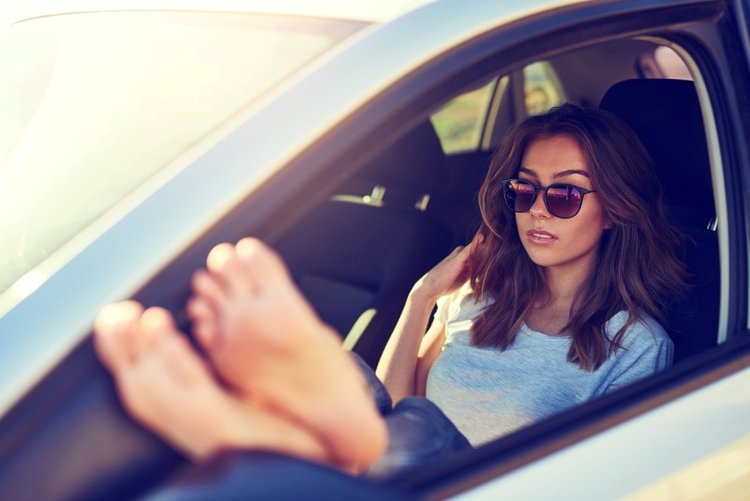Just like the ability to sprint in thongs is a proud Australian attribute (not to mention the ancient tradition of frisbeeing one on Australia Day morning) – many will smugly proclaim their own ability to negotiate the pedals whilst donning a pair of rubber flip flops. Similarly, you probably know someone who boasts about taking the wheel in six-inch stilettos.
Why? Possibly because they once heard it’s illegal to drive barefoot! In fact, this myth is so persistent it may have even been a driving instructor way back when who admonished them for kicking off their kicks before taking the driver’s seat.
The truth is, it is not only perfectly legal to drive without shoes – it may be preferable to do so in place of potentially dangerous footwear including thongs and high heels, both of which have been implicated in causing fatal road accidents.
So what is the law around footwear and driving? In fact there is no exact law forbidding any specific footwear in New South Wales whilst driving – however inappropriate footwear could be taken into account when considering the circumstances surrounding an accident because it is an offence to not have “proper control of your vehicle” – and certain footwear (or lack of footwear) may be deemed to have prevented the driver from doing so.
Whilst its not illegal to drive barefoot, it’s always better to make sure that you are driving in footwear that allows you to safely operate the car.
To drive barefoot or not is just one of a surprising number of myths and misconceptions when it comes questions around driving and the law. Often the answer is more nuanced than a simple yes or no; legal or illegal. Here are a few more common examples:
Is it illegal to drive with the interior light on?
Have you ever switched on the car’s interior light to read a map (remember paper maps?) and had the driver nervously cast a glance your way – because, careful, don’t you know that’s illegal?
In fact, there is no specific law against driving with the interior light on. Nonetheless, it does create reflections which could inhibit safe night driving. So if the driver asks you to switch it off, you’d best comply for your own safety. Also – see above about maintaining proper control of the vehicle (which includes “a clear view of the road, and traffic, ahead, behind and to each side of the driver”.
Is it illegal to eat and drive?
We’ve all done it – grabbed a bite as we rushed out the door to scoff on the way to work. While once again eating behind the wheel is not technically illegal, it is still a potential distraction and best avoided. (Try arguing you had complete control of your steering wheel and gear shift while eating a bowl of cereal and wearing platform heels!).
Is it illegal to drive while wearing headphones?
Again there is no written law specifically against wearing headphones whilst driving, but it certainly is not recommended – and could still land you in hot water with authorities if doing so is deemed to have caused an accident. Stick with the radio (but be careful not to “emit offensive noise” from your vehicle’s sound system – in NSW this is an offense carrying a potential $150 fine).
Is it illegal to drive below the speed limit?
Public awareness campaigns against speeding have been very effective – we all know “speed kills”, and the omnipresence of speed cameras and mobile speed units on our roads are another effective disincentive against driving too fast.
But what about the other side of the coin? Is it possible to drive too slowly? And if so, how slow is too slow? The wording used in the NSW Road Rules is that you cannot drive so “abnormally slow” as to cause an obstruction and for no reason. An example of driving abnormally slow is given as: “A driver driving at a speed of 20km/h on a length of road to which a speed-limit of 80km/h applies when there is no reason for the driver to drive at that speed on the length of road.”
Read more Shipton & Associates blog posts here.
This information and information published on our website and social media sites is general in nature and for information and entertainment purposes only. This information does not constitute legal advice and should not be relied upon as such. If you require legal advice which takes into account your personal circumstances, please contact us for an appointment.

